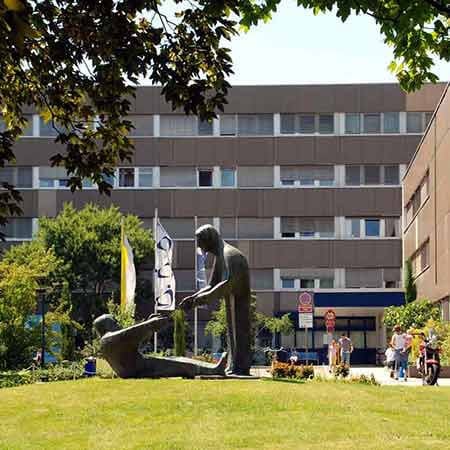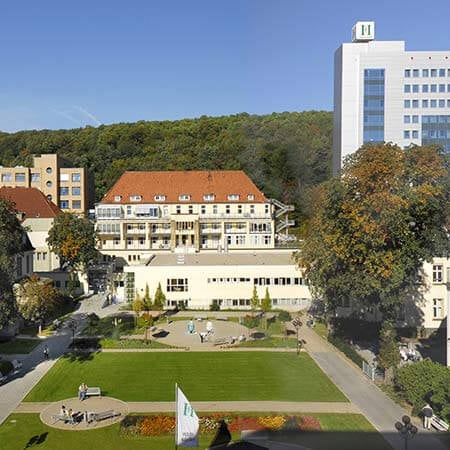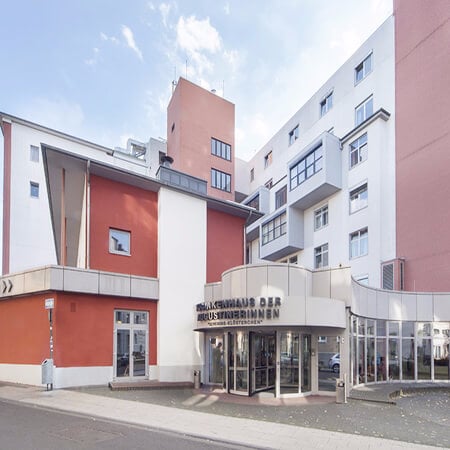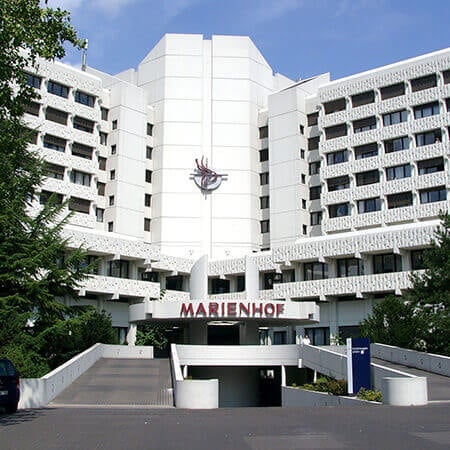Pleural mesothelioma
Pleural mesothelioma is a malignant oncological disease. The tumor arises from mesothelial cells. In recent decades, the incidence of this disease has grown by 8 times in the developed countries. Mesothelioma is more often diagnosed among elderly people. Two thirds of all patients are people over 65 years old. The disease is rarely revealed in people younger than 45 years old.
The Booking Health portal presents 90 German clinics specializing in pleural mesothelioma treatment
Show all clinics
Pleural mesothelioma – Diagnostics
Imaging methods (ultrasound, radiography, computed tomography, MRI) are used at different stages of the diagnostics. These methods give a chance to:
- Detect suspicious formation in the chest
- Assess the extensiveness of cancer process
- Assess the effectiveness of treatment
During positron emission tomography the radioactive agent is injected into the patient’s blood. Agent is absorbed by malignant cells much faster than by the healthy ones. This method of research is applied in order to detect metastases of pleural mesothelioma into the lymph nodes and internal organs.
While performing pleural puncture doctor takes the fluid from pleural cavity (the space between the visceral and parietal pleura). Doctor looks for the abnormal cells with the help of microscope. The method often gives the false negative results (its sensitivity doesn’t exceed 50%). Therefore, absence of pathological cells doesn’t exclude pleural mesothelioma.
During needle biopsy a doctor injects a needle into the tumor-like formation which was detected with the help of visualization methods. The doctor takes biological material for the subsequent morphological examination and then the histological type of tumor is determined.
Pleural mesothelioma can be:
- Epithelioid (65%)
- Sarcomatoid (10%)
- Mixed (25%)
Sarcomatoid tumor is considered to be unresectable. The epithelioid pleural mesothelioma has the best prognosis in the perspective of treatment effectiveness and patients’ survival.
Diagnostic thoracoscopy. Needle biopsy makes it possible to establish a clear diagnosis only in 85% of cases. Besides, this diagnostic method will not allow taking a lot of biological material for the histological test. That is why, it is not always possible to determine the tumor type. Here, the doctors use the most informative diagnostics method – a thoracoscopy.
Doctor inserts a thoracoport and then a thoracoscope with the surgical instruments into the chest through a small incision (up to 2 cm). Method allows taking enough biological material and establishing a certain diagnosis. Also, thanks to thoracoscopy doctor is able to estimate the extensiveness of the oncological process.
Best clinics for the pleural mesothelioma diagnostics in Germany:
Pleural mesothelioma – Treatment
Only surgical methods of treatment can prolong the patient’s life expectancy for several years. But in most cases pleural mesothelioma is inoperable.
Only 10-15% of patients receive surgical treatment. Other patients receive chemotherapy and radiation therapy that give a chance to slow down the tumor growth and prolong life expectancy for several months.
The favourable prognostic factors, when a person has higher chances for successful surgical treatment, are the following:
- Epithelioid type of tumor
- Less than 50 years old
- Preserved working capacity
- Absence of considerable weight loss
- Normal results of the clinical blood tests (white blood cells, platelets, red blood cells, hemoglobin)
- Normal level of LDH in the blood
- No pain in the chest
Pleurectomy (decortication) is the operation aimed at the removal of the pleura. Sometimes surgeons remove the diaphragm, pericardium fragments and tumor foci from the lungs. The parietal pleura is removed completely, visceral (adjacent to the lungs) is removed partially.
Pleurectomy helps to achieve two main objectives, such as:
- Increase patient’s life expectancy
- Eliminate basic symptoms of the illness associated with the accumulation of the fluid in the pleural cavity (among 95% of patients)
Extrapleural pneumonectomy is rarely performed for pleural mesothelioma treatment. This is the most radical surgery. Even in its minimal volume it presumes the removal of the pleura, a lung, half of the diaphragm and a part of the pericardium.
Pleural mesothelioma – Innovative treatment
Generally, the results of pleural mesothelioma treatment are not satisfactory. Patients’ life expectancy remains short. It is much worse than for the majority of other malformations.
Nevertheless, new methods of treatment are constantly appearing and traditional methods are being improved. This methods allow to gradually increase the average life expectancy of patients with pleural mesothelioma.
Latest treatments methods are:
- Photodynamic therapy implies injecting photosensitive substance intravenously. It is selectively accumulated in the malignant cells. When the source of red light is inserted into the chest, the medicine is activated and destroys the diseased cells.
- Target therapy presupposes the prescription of medicines that influence mesothelioma cells but, in fact, don’t touch the healthy tissues. Medicine called Sunitinib shows promising results.
- Gene therapy. Virus is injected into the patient’s pleural cavity. Afterwards, either virus damages the abnormal cells or immune system starts to destroy them depending on the virus type. This treatment method is still at the stage of clinical trials.
Best clinics for the pleural mesothelioma treatment in Germany:


Pleural mesothelioma – Rehabilitation
Most patients require rehabilitation after the treatment of complex oncological diseases. It includes the following aspects:
- Prevention of complications that may occur as a result of treatment. It can be pneumonia, lymphostasis, thromboembolic or infectious complications.
- Restoration of general health. The elimination of the consequences after surgeries and chemotherapy is carried out. The functions of internal organs are restored with the help of various medical and rehabilitation measures.
- Restoration of occupation. A person must not just stay alive. He must have physical and intellectual capabilities, which are sufficient for employment.
- Psychological support. First of all, it is required for patients, whose occupational performance was harmed because of the disease. Patients with deterioration of appearance also will benefit from psychological help.
- Restoration of appearance. If necessary, you can use surgical and other methods in Germany to restore appearance defects caused by cancer. For example, to carry out the reconstruction of the breast.
In German clinics, rehabilitation is carried out in a comprehensive manner. The patients are provided with qualitative care here. Doctors' monitoring and conservative treatment allow to avoid complications, which usually happen after treatment of oncological diseases. Psychotherapy, physiotherapy and physical therapy are actively used in Germany.
Specialists in different medical spheres take part in the rehabilitation process. These are massage therapists, speech therapists, specialists in physiotherapy exercises, physiotherapists. Social and occupational therapy is carried out, as well. If necessary, people are taught how to eat properly, take care of the postoperative scar, etc.
In Germany, rehabilitation is carried out with the maximum level of comfort for the patient. A person feels the results quite quickly and it improves his motivation and promotes further recovery.
Best clinics for oncological rehabilitation in Germany:
Author:
The article was edited by medical expert, board certified Dr. Nadezhda Ivanisova. For the treatment of the conditions referred to in the article you must consult a doctor; the information in the article is not intended for self-medication!
Source:
The cost of services includes
Here you can find the cost of treatment for this disease at the German University Hospitals. Leave a request and we will provide a free consultation with a doctor and will start organizing the whole treatment process.
The program includes the following:
- Issuing of an invitation for getting a visa for treatment as quick as possible
- Fixing an appointment at a time convenient for you
- Preliminary organization of a comprehensive examination and discussion of the forthcoming treatment plan
- Arranging transfer from the airport to the hospital and back to the airport
- Provision of interpreting services and services of a personal medical coordinator
- If necessary, assistance in the organization of further surgical treatment
- Provision of a medical insurance against treatment complications covering up to 200,000 euro
- Preparation and translation of medical records and recommendations from the hospital
- Assistance in the subsequent communication with your attending physician, including consultations on repeated X-ray images through the unique medical document management system E-doc





